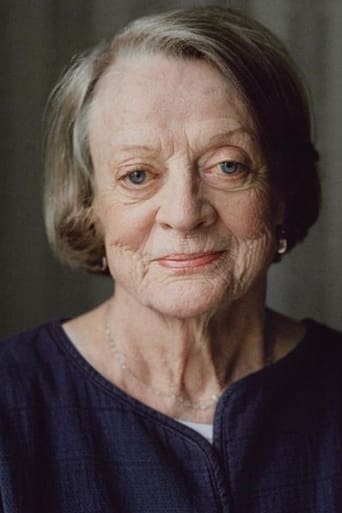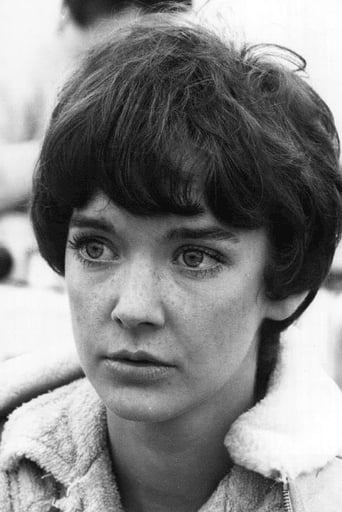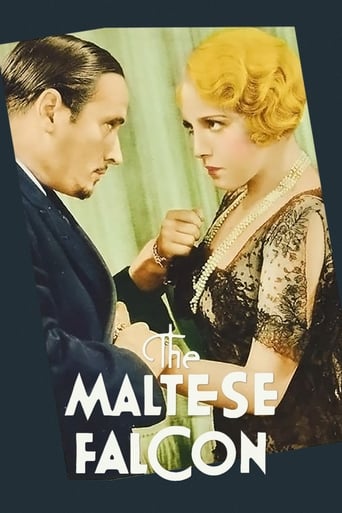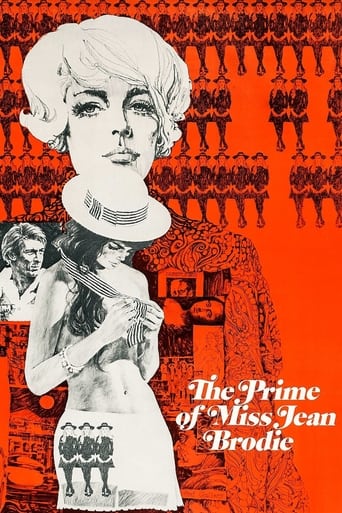
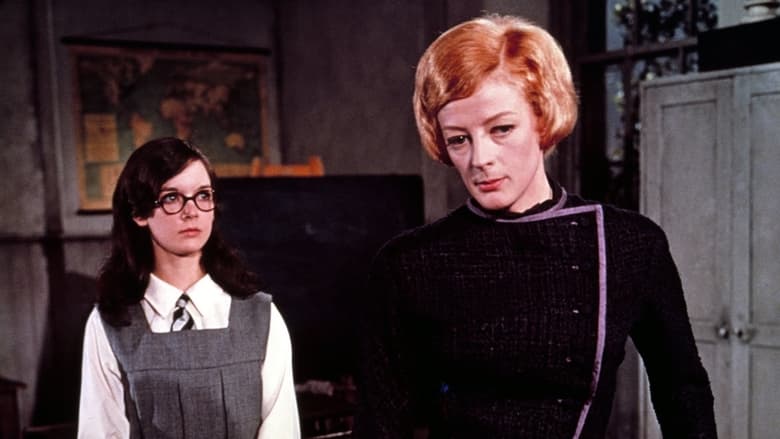
The Prime of Miss Jean Brodie (1969)
A headstrong young teacher in a private school in 1930s Edinburgh ignores the curriculum and influences her impressionable 12-year-old charges with her over-romanticized worldview.
Watch Trailer
Cast


Similar titles
Reviews
This is one of the reasons British films have a tendency to be so much more well-written than American films. This is a film about complex characters, even the girls. It is a film about innocence and intrigue at the same time. It is a film featuring young girls as pure as the driven snow and others as scheming as Satan. It asks questions like, "What is the greater good?" and "Exactly where does education and the exposure to new ideas end and dangerous, lethal fantasies begin?" Is Sandy motivated by a mature recognition of the dangers of letting a Jean Brodie send people off to tilt at windmills, or does she want to destroy a sexual rival? Perhaps it is all of these. What is remarkable is the performances of the major characters. This film marks the beginning of Dame Maggie's tenure in the A list of actors. Nearly every volatile emotion in the human condition is on display in the character of Miss Brodie. The audience will spend most of its time delighting in the traps that Miss Brodie evades and waiting for the simmering essence of Sandy to emerge. A bit of warning - be prepared to watch this film a couple of times before the dust of the plot settles into a schema that makes sense.
"The Prime of Miss Jean Brodie" is on the surface the story of a woman who is too romantic for her own good. And unfortunately she is a teacher at a girl's school in Edinburgh, Scotland in 1936, and she does not realize how popular and dangerous she is.Maggie Smith (who won her first of two Oscars for this performance) plays the part with a verve and style a real Jean Brodie would appreciate, and though Smith was a young woman at the time she also carries an additional burden of the character - not only is Jean a beautiful and enticing woman, but she is getting older and is worried about losing that critical edge in matters of sex that such types fear.She is having affairs with the school's art teacher (Robert Stephens) and another teacher (Gordon Jackson - later "Hudson" in "Upstairs, Downstairs"). Both men want her to marry them, but she is too flirty (she'd say independent) to do so. None of this sits well with the prim head of the school (Celia Johnson - the sad heroine in the classic "Brief Encounter"). It also does not sit well with Ms Johnson that Brodie has developed a minor cult of personality with those girls who have her as a teacher. She constantly refers to the students as "her gails", and boasts she transforms them into young women by opening up their minds.Actually she does open them (to appreciating art, life, love - she encourages them to "experiment" with men), but she is closing them to modern realities. Like many people in Great Britain in the 1930s (like George Bernard Shaw for awhile) she appreciates the firm "let's get things done" attitudes of Fascists on the continent like Mussolini and Franco (she does not mention Hitler, however). She believes them far more superior than the seemingly drab upholders of constitutional government like Stanley Baldwin (the current Prime Minister in 1936) or Ramsay MacDonald (the previous one). That the latter two, in the long run, did less harm than her heroes did is something she never gets a chance to talk about.* [*In the novel and in a longer television version on Masterpiece Theater back in the 1980s, Jean does get her view thrown into her face - a refugee from the continent is invited to tell about how wonderful the Fascist "revival" is there, and the young woman gives Jean and her students an angry earful about how wonderful these leaders really are!] She does have a bad affect on one chubby, somewhat slow girl named Mary MacGregor. Mary is convinced to run off to Spain to fight with her brother. But Mary happens to join Franco's side and is killed. Her brother was fighting Franco.Johnson, in the end, is assisted by her school spies (one is a silent, wormy little woman whose brother is a local Presbyterian church elder), and by one of the girls who seems to come to her senses. In the end Jean is forced to leave the school, and confronts the girl who turned on her, whom she labels an assassin.Actually the event are a little complicated here. The girl is having an affair with Robert Stephens, and sees he still carries his torch for Brodie. Fed up she is determined to get her vengeance on Brodie, and she tells Stephens why he will always be a third-rate painter. She is triumphant over Brodie, but she is aware that her character has been shown to be selfish and sneaky, and will never change. Johnson does get rid of Brodie, but has to be truly under-handed to do so. And Brodie, for all the shame of being forced out by these two still has her own sense of self-worth, comparing herself at the end to her ancestor Deacon William Brodie, the Edinburgh carpenter, cleric, and town councilor who was also a burglar at night, and was hung publicly on a gallows he had constructed.** Brodie might be down for the count as the film ends, but she will survive. Possibly better than her assassin will.[**Deacon Brodie's story is better known to most people than we think. Robert Louis Stevenson's "The Strange Tale of Dr. Jeckyll and Mr. Hyde" was based on this tale.]
The Prime Of Miss Jean Brodie hit an entertainment trifecta so to speak. A successful novel by Mary Spark, a successful Broadway play with a 379 performance run in 1967-69 and finally an Academy Award winning film, you can't do better than that. Not to mention the Tony Award it won on Broadway for Zoe Caldwell. The starring title role is a choice one, it garnered both a Tony and an Oscar for the two different actresses who played it.On screen once you see Maggie Smith play the headstrong teacher Jean Brodie from a girl's school in Scotland in the Thirties you will not forget her. If you've seen the Alfred Hitchcock classic Rope you have some idea what Jean Brodie is all about. In Rope James Stewart plays an iconoclastic teacher who talks about superior beings and later on he sees what kind of influence he's had on impressionable youth at the fancy prep school he teaches at when Farley Granger and John Dall do a thrill killing because they've convinced themselves they're somehow superior.Stewart's students do damage to others, Maggie Smith's charges do damage to themselves. Smith's students drink a little too deeply from her advice about being adventurous women and exploring the world. She's also an admirer of 'superior people' who become leaders and her example is Benito Mussolini in Italy who was legendary for making the trains run on time in his country. She also encourages her students to explore their sexuality, initiate themselves with an affair with an older man, all in the name of becoming worldly and modern females. That does not sit well with principal Celia Johnson who vows to get rid of Smith. In the end Johnson has ample ammunition to do the job. Young Jane Carr as the naive girl who takes Smith all too seriously goes off to Spain to fight in the Civil War there. Carr's brother is already there, but Carr listening to her teacher extol the virtues of that superior leader Franco goes and enlists on his side. She gets herself killed in Spain.But not before Pamela Franklin decides to lose her virginity to art teacher Robert Stephens who Smith was involved with. She also becomes a sadder and wiser girl way too young. But she delivers some really biting lines at both Smith and Stephens, exposing the pretensions both have.One thing that American audiences might not get is a small bit where Smith covers the portrait of Great Britain's Prime Minister at the time, Stanley Baldwin. Baldwin was the Tory Prime Minister in his third ministry at this point and he was first elected with the exciting slogan of Safety First. That could mean many things, but what it was taken by the British public to mean at the time was a calm and quiet leadership, a British version of Calvin Coolidge. Hardly the kind of guy that Jean Brodie would admire like Mussolini or Franco.Jimmy Stewart finds out and realizes just how his philosophy has effected his pupils, but for Miss Jean Brodie she remains absolutely clueless to the end. Nevertheless Maggie Smith's bravura performance of this clueless teacher won her a deserved Oscar.The Prime Of Miss Jean Brodie also got an Oscar nomination for Rod McKuen's song Jean in the Best Song category. But the Academy voters gave the award to Burt Bacharach and Hal David for Raindrops Keep Falling On My Head. They were clearly the best songs in 1969's field.Though Maggie Smith got the Oscar a lot of the other performances were also unforgettable. Celia Johnson, Pamela Franklin, Robert Stephens and Gordon Jackson who played another teacher that Smith was involved with are memorable, you will not forget Jane Carr as the touching and naive young girl who dies in Spain trying to impress her idiotic teacher. She should have been nominated herself in the Best Supporting Actress category.Jean, Jean, you will not forget clueless Jean Brodie once you've seen the film.
I can't even put words on this movie. It's too much. If ever there was a film "before it's time" it's this. The level of depravity, insight and emotional power is different from anything else I have seen. It's almost unrateable, but a 10/10 should do.Maggie Smith(who deserved her Oscar!!!!!!!!!!) plays a teacher so obviously deranged but still so human. In fact all the main characters in this film are humans in their purest form: FLAWED, but not directly evil. The characters, no matter how devious do believe to be in the right, and they often are.From the revolutionary fascist snob who considers herself the best example of humanity and has the depravity to try to form the girls in her own image and after her own sickly plans also teaches them individualism and to fight for what they believe. The black hearted, spiteful and utterly conservative Christian principle Miss MacKay(Celia Johnson) do at heart have more or less good intentions, at least in regard to the children. Oh and to make it clear the film is not about the struggle between these characters but rather about life.Beyond any doubt Ronald Neames greatest effort, and this is the director who made The Man Who Never Was. It doesn't even compare in greatness, nor impact. This is just extraordinary. It's a unique power to manage to make such a portrait were nobody are really in the right and despite huge flaws such as fascism, prejudice, adultery, weakness, spitefulness and to some extent even pedophilia they are still likable. This is not only a powerhouse of performances. I need to point out how amazing Pamela Franklin was as well!!!! But also a powerhouse of emotions and uncertainty. In essence, truly human.


